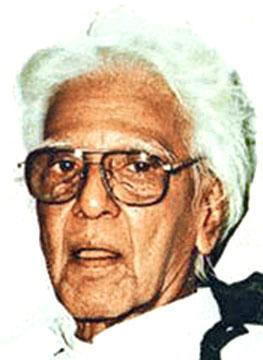
The 115th Birth anniversary of Rev. Fr. Marcelline Jayakody, an exemplary template priest and an exponent of indigenous culture is commemorated on June 3. Fr. Marcelline Jayakody was a well known Catholic priest, musician, poet, lyricist, writer and patriot. Fr. Jayakody is a household name in the country, who had an eventful career. He was endowed with the Midas touch and every task he undertook turned into success. He lived a life full of achievements.
Fr. Jayakody had his primary education at the Sinhala school of Madampe and secondary education at St. Joseph’s College Colombo. It was only in 1920 that Fr. Jayakody entered St. Bernard Seminary where later he was ordained a priest on December 20 1927 by Dr. Anthony Coudert, then Archbishop of Colombo. Fr. Jayakody hailed from Sandalankawa, his father was a reputed native doctor and a devout Catholic. His mother was born to a Buddhist family and embraced Catholicism after marriage.
Fr. Jayakody was endowed with love and devotion for our national culture and read the epics of the great. He is considered as a cultured exponent of indigenous culture. He started decorating the church with gokkala and lotus flowers for church celebrations to which the social peerage and westernized priests objected and showed vehemence. As a young priest he was criticized for offering lotus flowers at the wedding mass of one of his relatives. In the early days of 20th century dubbing Sinhala words to Latin and Western tunes for hymns was the normal practice. Fr. Jayakody too at the beginning wrote hymns, especially, carols adopting western melodies. In 1934, he composed the hymns, ‘Asiri Soma Sapiri Sama’ and the popular carol ‘Raya Tharu Babalanawa’ set to his own music. These hymns became very popular and are admired even today. In the 1940s and 1950s there was a national reawakening in Sri Lanka. Such patriotic sentiments had its effects on the Catholic Church too. Fr. Jayakody then began to compose hymns like, ‘Ronata Vadina Bingu Obay’, ‘Nelum Pipeela Pethi Visireela’ and ‘Suvanda Jale Pipi Kumudiniye’ with a national flavour. These exemplary hymns with their superb lyrics, sweet music and local setting mesmerised the hearts of all and the cultured aesthetes.
The lyrics and hymns of Fr. Jayakody are close to the people, popular in churches and appreciated even by non-Catholics. His compositions contain both, Christian aspects and the national outlook. They are a classic example of cultural adaptation in its true perspective. In 1949, he was appointed Editor of Sinhala Gnanartha Pradeepaya, the Catholic weekly in Sri Lanka. He set up the caption of ‘Gnanartha Pradeepaya’ in a traditional cultural background. Today, this caption of the Sinhala Catholic Newspaper still continues. He increased the pages from 8 to 12 and introduced religious feature articles with an indigenous outlook.
Fr. Marcelline Jayakody entered the cinema world successfully, while many were puzzled at his intention, as films in Sri Lanka had not reached the required standard for a Catholic priest to get involved. In 1956, ‘Rekawa’ Directed by Lester James Peries revolutionized the cinema in Sri Lanka. Until then most of the Sinhala films appealed only to the gallery. Lester James Peries got Fr. Jayakody to write lyrics for songs in Rekhawa and Sunil Shantha to provide music for them. Fr. Jayakody underwent vocal music training and theory at the Shanthinikethana in India set up by Rabindranath Tagore.
After returning from India he had a short stay in Jaffna learning their culture, and their simple and serene lifestyles. On such matters he wrote a series of articles and later compiled in a book named ‘In search of Ceylon’. In 1970 Fr. Jayakody started writing a column in the Catholic Messenger newspaper. After 1976 Fr. Jayakody began to write Sinhala poetry as a series to the ‘Kaviya’ Magazine appreciating Buddhist Sinhala culture. ‘Muthu’ was a collection of poems carried in the Kaviya Magazine.
‘Muthu’ written by Fr. Jayakody won the Presidential award for the best poetry work in 1979 and the famous ‘Magsaysay’ prize was awarded to him in 1983. Fr. Jayakody was also known to be a prominent journalist writing to the Catholic and other secular press. He was an ardent active member of the ‘Sinhala Hela Havula’, initiated by Munidasa Kumaratunga. Fr. Jayakody until his death was the President of the Sinhala Poets’ Association. In 1953 Fr. Jayakody was among the staff of St. Peter’s College Colombo. While teaching at St. Peter’s he joined Heen Baba Dharmasiri to set up an oriental arts centre and introduced indigenous fine arts to this leading Catholic school. In 1995 Ven. Ittapane Dhammalankara Thera released a book on the life of Fr. Macelline Jayakody titled ‘Malpele Upan Pansale Piyathuma’. This is the first book in the whole world written by a Buddhist prelate on a Catholic priest.
His devoted services to Arts, Culture, and journalism, was amply rewarded and honoured, when the State conferred on him the ‘Kalasuri Title’ and the Kithu Nandana Pranamaya by the Catholic church recognising his magnificent contributions to the arts and culture in Sri Lanka for over six decades. When he was the parish priest of Duwa its passion play was performed with images of sacred personages based on the centuries old ‘Nine Sermons’ in the ‘Dukprapthi Sangrahaya’ written by Fr. Jacome Gonsalvez. At the time no one dared to use human actors in passion plays at churches. Fr. Jayakody boldly did away with this tradition using human actors for all the scenes except for Christ and Mary. Here he composed many hymns in addition to the traditional Pasan.
Fr. Marcelline Jayakody passed away at the age of 95 on January 15 1998, leaving an unfilled vacuum among all our cultured patriots and Artists.
Miran Perera
